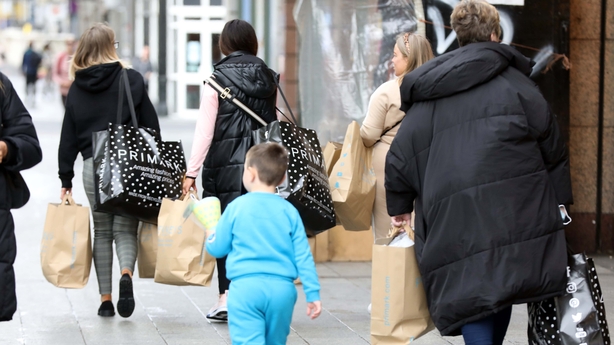The cost-of-living crisis continues to weigh heavily on the mood of Irish public despite a stronger economic forecast and slowing inflation, according to Penneys Pulse of the Nation Index.
It shows that the public mood does not match up with an improved economic outlook.
The report reveals that 86% of the public took steps to manage their energy bills last winter, while 71% of adults are eating out or getting takeaways less, and almost half of households (47%) have cancelled an entertainment subscription.
It also shows that 62% of shoppers have switched to a more affordable grocery retailer, and 68% are treating themselves less and 69% are socialising less in a bid to better manage their household finances.
Penneys said it has seen how shoppers are continuing to wear warmer clothing in a bid to keep energy bills under control. Sales of velvet fleece-lined leggings soared by 39%, which equates to six pairs of leggings sold every minute in Penneys' 37 Irish stores.
The retailer also saw huge demand for its women’s fleece jumpers, with over 80 sold per hour in stores.

According to the index, parents with children under the age of 18 living at home with them have the least confidence in the economy compared to all other demographics, with over half (56%) expressing a negative outlook.
With dependents bringing extra cost to households like childcare and additional groceries, Irish families are struggling with managing their finances and as a result, are far more likely to engage in money saving hacks than the typical consumer.
When considering a purchase, the index found that parents typically can only spend about half of what an adult without a dependent child will. The latest Pulse research has shown how adults without dependent children outspend parents every time.
The research shows that adults without dependent children spend an average of €50.97 each at a restaurant compared to an average of €26.44 per person for families;
They also spend an average of €72.14 for adults without dependents compared to an average spend of €30.98 per person for families.
For many, the main source of this constrained spending is childcare costs. Over half (56%) of the working parents surveyed admitted they had to cut back on family fun to help manage childcare costs.
As a result, almost half (48%) of families confirmed they did not do as many day trips or activities during the summer last year and a third (34%) of families could not afford to go on holiday abroad.
Head of Penneys Ireland Fintan Costello said: "The value mindset can be clearly seen in this latest Pulse of the Nation Index, which highlights how shopping around for value is still now firmly embedded in Irish consumer behaviour.
"We see this in our own stores and consumers’ buying behaviours - specifically parents and women - who are making tough choices and are snapping up value products that either help them manage household costs like heating bills or allow them to treat themselves or loved ones on a budget."
He said the retailer is working harder than ever to ensure Penneys is accessible for everyone.
Amárach Chairman Gerard O’Neill said: "While the macroeconomic picture has improved and the Irish public has benefited from a range of direct supports to offset increasing household costs, the latest Penneys Pulse of the Nation Index has revealed that Ireland appears to be experiencing an interesting trend akin to what the US has gone through - a 'vibecession’ - whereby the public mood remains downbeat despite the positive economic indicators."
He said, while the research has found that the majority of people are relatively happy with their quality of life, a person’s financial situation is still having a disproportionate effect on their overall state of mind, with women, families, renters and low-income households being hit the hardest.

